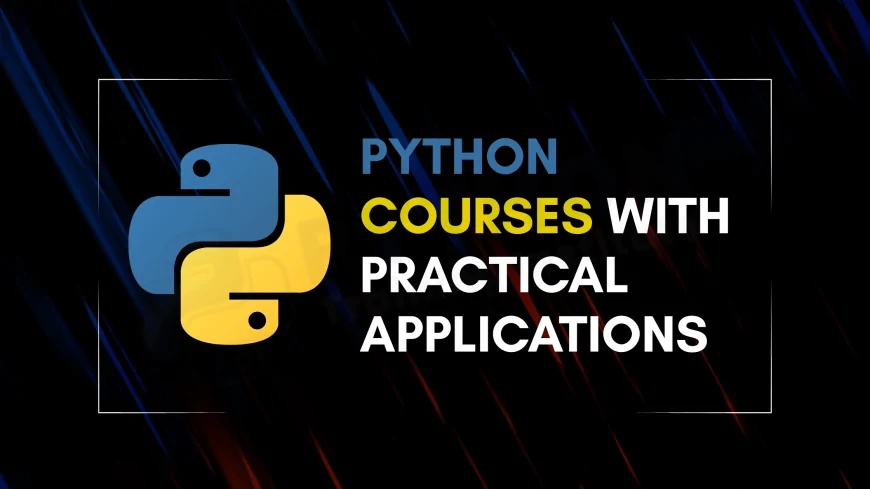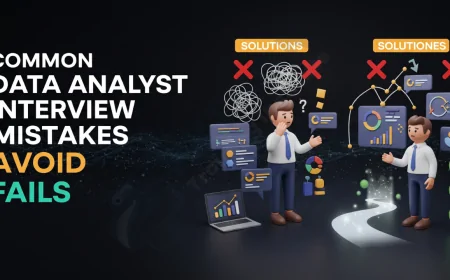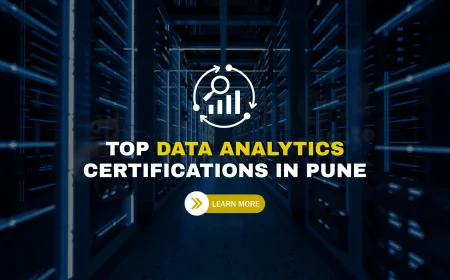Top Python Courses That Teach Practical Applications for Career Success
Discover top Python courses that focus on real-world applications and hands-on training. Learn practical Python programming through project-based learning and boost your career with job-ready skills in Pune.

Riya, a fresh graduate in Pune, started learning Python from free resources online. She breezed through "Hello World" and syntax lessons. But when it came to real-world coding—building an app, analyzing data, or automating tasks—she froze. The tutorials hadn’t prepared her for practical implementation.
She’s not alone. Thousands like her enroll in Python courses hoping to build real tech skills, but end up only mastering theory. The gap between "learning Python" and applying Python is wide.
This blog is your guide to Python courses that actually bridge that gap—programs that move beyond syntax to problem-solving, real-world projects, and industry-relevant skills.
Why Practical Python Skills Matter
Python is more than just a beginner-friendly language—it's a versatile powerhouse in:
-
Web development
-
Data science
-
AI/ML
-
Automation
-
Scripting
-
Cybersecurity
-
Game development
But none of these can be mastered by memorizing code. You need to build, debug, test, and deploy. Courses that focus on practical applications simulate real job roles and prepare you for workplace challenges, not just exams.
What Makes a Python Course “Practical”?
Here are the defining characteristics of courses that teach real-world application of Python:
1. Project-Based Learning
-
Every module ends with a hands-on project.
-
Projects simulate real scenarios: building APIs, automating Excel tasks, or processing sensor data.
-
Encourages critical thinking and problem-solving.
2. Case Studies and Capstone Projects
-
Learners solve end-to-end problems, like customer churn prediction or e-commerce dashboards.
-
Capstone projects consolidate learning with large, multi-layered challenges.
3. Live Coding & Interactive Labs
-
Live coding sessions, not just static videos.
-
Use of virtual environments to run experiments.
-
Tools like Jupyter Notebooks, VS Code, and Git for hands-on work.
4. Industry-Relevant Tools & Libraries
-
Courses teach how to work with:
-
Pandas, NumPy for data
-
Flask, Django for web apps
-
BeautifulSoup, Selenium for scraping
-
PyTest for testing
-
Matplotlib, Seaborn for visualization
-
OpenCV, TensorFlow for advanced topics
-
5. Automation-Focused Modules
-
Automating emails, file handling, database management.
-
Writing scripts that save time in real tasks.
6. Career-Oriented Curriculum
-
Practical interview preparation (coding tasks, take-home assignments).
-
Focus on job readiness: portfolios, GitHub presence, documentation writing.
Examples of Practical Applications You’ll Learn
Here are the kinds of things top practical-focused courses help you build:
1. Data Cleaning Script
-
Read messy CSVs and clean missing data
-
Use Pandas to prepare datasets for analysis
2. Web Scraper for Job Listings
-
Automate extraction of job postings from job boards using BeautifulSoup and requests
3. Personal Expense Tracker Web App
-
Build with Flask or Django
-
Use SQLite for backend storage
-
Learn to deploy on cloud platforms
4. Email Automation Bot
-
Automatically send bulk emails using SMTP
-
Attach PDFs, dynamic content, or reports
5. Stock Price Notifier
-
Pull data from APIs
-
Send Telegram or SMS alerts when prices hit certain levels
6. Face Detection Tool with OpenCV
-
Work with images and video frames
-
Learn how AI recognizes patterns
Choosing the Right Course: What to Look For
Before enrolling in any course, ask these questions:
1. Does it include real projects?
Avoid courses that only show how to write "print" statements and simple functions.
2. Are you writing code or copying it?
Look for platforms that make you think and debug—not just follow along blindly.
3. Does it simulate real work?
A course that teaches version control, deployment, testing, or optimization is worth more than one that just teaches loops and conditions.
4. Will it build a portfolio?
You should walk away with GitHub repositories or deployable apps to showcase in interviews.
Python for Different Career Paths
The best practical Python courses are tailored to career goals:
1. For Data Analysts
-
Data wrangling
-
Dashboards
-
Reporting automation
2. For AI/ML Engineers
-
Model building
-
Feature selection
-
Evaluation metrics
3. For Web Developers
-
Backend APIs
-
User Authentication
-
MVC structure
4. For Cybersecurity Professionals
-
Log parsing
-
Pen-testing automation
-
Malware analysis scripts
5. For Automation Experts
-
System scripting
-
Task schedulers
-
ETL pipelines
Practical Learning Techniques That Work
1. Hands-On Challenges
Sites that provide code challenges based on real-life problems are gold.
2. Debugging Exercises
Learning through errors makes you resilient and resourceful.
3. Peer Code Reviews
Reviewing and improving others' code enhances your own thinking.
4. Mock Projects
Creating simulated client tasks like “build a CMS for a bookstore” helps sharpen practical design skills.
Global Trends in Practical Python Education
-
Micro-Credentials: Short, project-based Python modules are replacing traditional long-form courses.
-
Portfolio-Driven Learning: Learners are judged more by GitHub than GPAs.
-
Career Simulations: Bootcamps now replicate the pressure and deliverables of actual tech jobs.
Benefits of Practical Python Courses
-
Learn problem-solving, not just syntax.
-
Build a job-ready portfolio.
-
Get comfortable with industry tools and practices.
-
Grow faster by applying knowledge daily.
-
Become confident in interviews by discussing real projects.
FAQs
1. What is a practical Python course?
A practical Python course emphasizes projects, applications, and real-world problem-solving over theory and textbook exercises.
2. Are practical Python courses suitable for beginners?
Yes, especially when they start from basics and build up to projects gradually.
3. What are common tools used in practical Python training?
Common tools include Jupyter Notebooks, Pandas, Flask, Django, Selenium, and Git.
4. Can I build a career with only Python knowledge?
Python is a great starting point, but you’ll need domain-specific knowledge like data science, web development, or automation to stand out.
5. How long does it take to complete a project-based Python course?
Anywhere from 8 to 24 weeks, depending on intensity and depth.
6. Will I get a job after completing such a course?
Courses with hands-on projects and a portfolio significantly improve your job chances.
7. Do these courses include testing and deployment?
Good ones do. Practical courses often cover unit testing, debugging, and deploying apps to the cloud.
8. What kind of projects can I expect?
Examples include web apps, automation tools, data analysis projects, and mini-AI models.
9. Is Python good for non-tech backgrounds?
Yes. Python is beginner-friendly and widely used in finance, marketing, operations, and more.
10. Are certifications important?
Projects matter more than certificates, but certifications validate your learning to employers.
11. Can I use Python for freelance projects?
Absolutely. Python is in demand for web scraping, dashboards, chatbots, and automations.
12. What’s the difference between theoretical and practical Python?
Theory teaches you how code works; practical training teaches you why and when to use it.
13. Are weekend-only classes enough?
If they're intense and project-driven, yes. But self-practice is key.
14. What should a beginner’s first project be?
Start with an expense tracker, calculator app, or a basic data visualization tool.
15. Can Python be used in cybersecurity?
Yes. It's often used to automate scanning, monitor logs, or create detection systems.
16. Do practical courses include code reviews?
Top-tier ones do. Peer or mentor reviews help improve your thinking.
17. Is math required for Python?
Not much for web and scripting. For AI/ML, some linear algebra and stats help.
18. What’s the best way to retain Python knowledge?
Build daily, solve problems, and write real code. Projects stick better than flashcards.
19. Do practical courses prepare you for interviews?
Yes. They usually include mock coding tasks and portfolio guidance.
20. Can I switch careers with Python?
Definitely. Python is a gateway to tech careers across domains.
21. What are capstone projects?
Capstone projects are comprehensive, real-world challenges that apply everything you've learned.
22. Do these courses include Git and version control?
Yes, any practical course should teach Git workflows, branches, and repositories.
23. Are there community or group projects?
Some advanced courses offer collaborative projects that simulate team environments.
24. Is live mentorship part of practical training?
In many hands-on courses, yes. It ensures accountability and faster feedback.
25. Are these courses suitable for college students?
Definitely. They complement academic theory with marketable skills.
Why Practical Learning Is the Future
If you're tired of shallow tutorials and want to actually build, automate, solve, and create—you need a Python course that teaches practical applications.
From writing scripts that save hours of work to building apps that impress recruiters, the power of Python is unlocked only when you use it to solve problems.
Look for courses that put you in the driver’s seat—real code, real tools, real outcomes.
Because in the tech world, it’s not what you know—it’s what you can do.
What's Your Reaction?
 Like
0
Like
0
 Dislike
0
Dislike
0
 Love
0
Love
0
 Funny
0
Funny
0
 Angry
0
Angry
0
 Sad
0
Sad
0
 Wow
0
Wow
0














